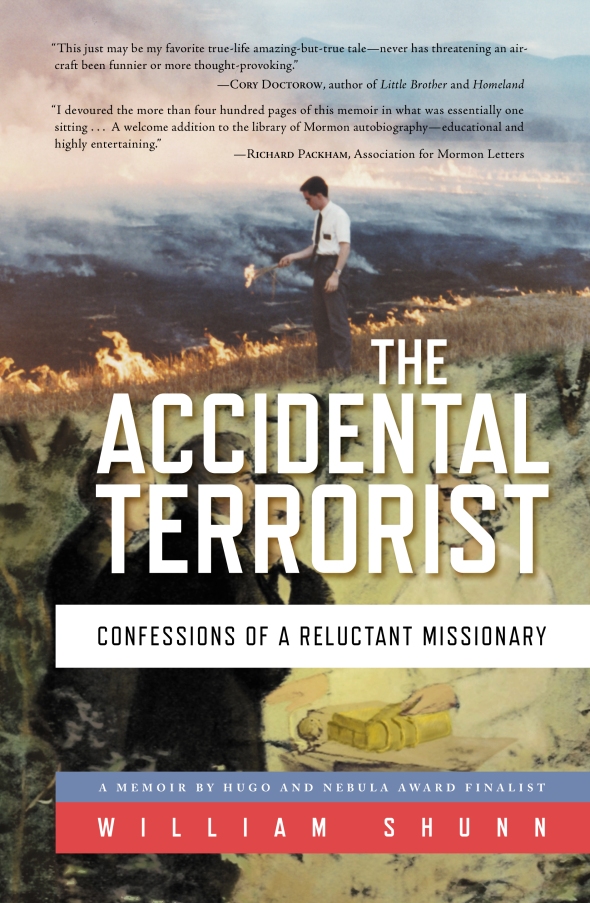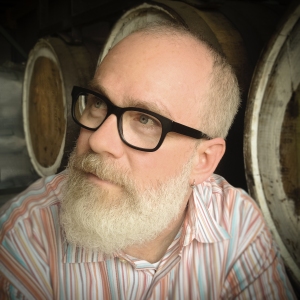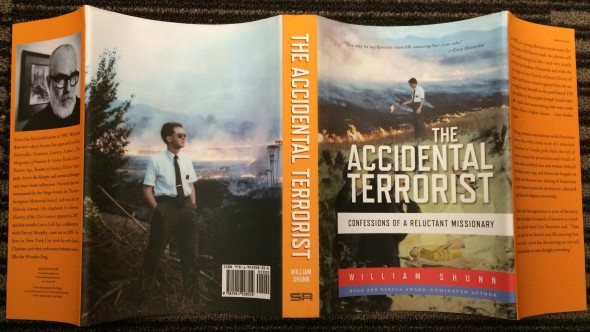The Hardest Part: William Shunn on The Accidental Terrorist
← November newsletter: Kelly Link, Bill Nye, and The Wheel of Time Companion; publishing news; Bull Spec Turns Six; and morePaul Kincaid's From the Other Side, November 2015: Europe at Midnight, An Atlas of Countries that Don’t Exist, Trudi Canavan, Mira Grant, Emma Newman, and more →
The Hardest Part: William Shunn on The Accidental Terrorist
Posted on 2015-11-23 at 20:27 by montsamu
In early 2009 when I started taking reading and writing seriously again, one of the first authors I “discovered” was William Shunn, whose Proper Manuscript Format for Fiction Writers is practically required reading, and who, along with his fellow Blue Heaven workshop/retreat authors Paolo Bacigalupi and Greg van Eekhout were active — and welcoming! — on Twitter, even to those writing umbrella duel fan-fiction inspired by their Electric Velocipede stories. Van Eekhout’s Norse Code had yet to be released that summer, Bacigalupi’s The Windup Girl was still months away from publication that fall, and watching Shunn banter with and encourage them was certainly a great model for a Twitter and genre newbie such as myself. Shunn’s own book that winter was Cast a Cold Eye (with Derryl Murphy), but it is his 2007 Nebula and Hugo Award finalist novella Inclination which I think is the best corresponding genre reading to bring along for his new memoir The Accidental Terrorist: Confessions of a Reluctant Missionary.
In Inclination, we follow a young, first person protagonist’s emergence from the protective shell of his religious upbringing into the wider world of a space station, populated with all manner of interesting characters, and on through his growth in awareness of what exactly he has been sheltered from, and finally on to a satisfying conclusion. Even the “tip of the iceberg” knowledge that Shunn was raised Mormon and had since left the LDS Church makes the comparisons to his real life experience easy; anyone (like me, for instance) who was raised in a conservative religious family and later had to resolve the conflict between spirituality and reality, whether leaving their faith or affirming it, can at least find in Shunn’s novella the essence of that struggle, of that question.
With The Accidental Terrorist, Shunn shows us more than the tip of the iceberg, more than the rough outlines of “once I was a member of the Church of Jesus Christ of Latter-day Saints, and then something happened, and now I am not”. It is the sometimes unbelievable true story of a young man who, having attended the Clarion Writers Workshop at age 17, was by age 19 convicted of felony mischief while on his LDS mission, preaching in Alberta, Canada.
Its prelude is written in Shunn’s first person present, a 19 year old in a Canadian interrogation room, being accused of terrorism and conspiracy. From there, the book is divided into three parts, following a primary narrative of Shunn’s intake interview and mission, interspersed with both personal and LDS history. We see both Shunn’s training in Canada (“Okay, let’s, um, go over what you did wrong there.”) and his father’s questioning him two years earlier about whether and why he wanted to serve a mission; we read about the “First Vision” of Joseph Smith and the 1830 publication of The Book of Mormon.
While some of the ongoing narrative, particularly the socially uncomfortable bits, evokes at least humor if not glee, there’s a line very early on, as Shunn recalls his conversation with his father, of not being able to admit that his words of fidelity to the church were “ashes” in his mouth, that reveals another of the through notes of the book, a tone of the melancholy of closed possibility: “I never for a moment considered giving an honest answer. Where that might have led, what it might have changed, I do not know.” It’s first and foremost, though, an eye-opening page-turner, an impending car crash you can’t turn away from, a first-person account of one young man’s shoes going door to door, increasingly unsure of the worth of the work to which he has devoted his life.
[gallery ids=“5551,5550,5549,5553,5552” type=“rectangular”]
It’s also a beautiful, beautiful book, “even though it’s self-published!” I loathe putting such a line even into scare quotes, but it really is a beautiful, dust-jacketed hardcover with lovely design both inside and out. The typography is excellent, with an attention to detail that stands shoulder-to-shoulder with the best in the business: comfortable kerning, drop caps, deft first-line touches, small caps, italics, everything coming together in a package that makes the book a physically solid and thoroughly satisfying reading experience.
For The Hardest Part, Shunn doesn’t write about any of that, though I can certainly imagine his late nights tinkering with margins and layouts. He doesn’t write — much — about the decision to self-publish. He does give an insight into the hard part of making the book publishable, of the hard work of revising the book beyond the “what” and the “how” to the “why”.

— Essay by William Shunn —
There is no part of the writing of The Accidental Terrorist — the memoir of my adventures as a Mormon missionary in Canada — that was not hard.
It’s been nearly seventeen years since I sat down and began consciously organizing my memories on note cards with the intent of composing a magnum opus, the most comprehensive and dazzling immersion in the modern Mormon worldview ever written — a book that would also make perfectly clear why I made the bomb threat that got me expelled from Canada in 1987. (There’s nothing like setting a high bar for oneself.)
It was hard to excavate and examine many of those memories. It was hard, after initial enthusiasm from several editors, to see their interest dry up as my page count climbed toward the quadruple digits. It was hard to watch scandal after scandal rock the memoir marketplace, making things more difficult for those of us who were trying to write truthfully. It was hard to pass through a succession of six different agents, nearly twice that many drafts, and more than twice that many years, and harder still to face the fact that, through its many reworkings, I had revised the blood and bones right out of my book. It was hard to run into writer friends at conventions and have them shake their heads and say they couldn’t understand why no one had ever snapped up that memoir of mine. It should have sold like that.
By contrast, it was easy to make the decision to self-publish when my wise new agent suggested — if for no other reason than to clear the mental runway for other projects — that it was what I needed to do. My wife and I had been thinking along those lines for some time already. The problem was, I knew the book was in no shape to publish, and both my agent and I were out of ideas for how to fix it. As much as I needed to get it done and out there, I could not publish something I knew was broken.
Fortunately, my agent and I both know plenty of editors, some of whom do freelance work, and it turned out we both had the same name in mind. I emailed. She was available, she was affordable, she was ready to dig into the manuscript…
A few months later, her notes arrived. And then came the hardest part.
It wasn’t resetting the bones of the book. That was fairly straightforward work, once my editor showed me where I needed to snip and tug and bind. But the blood of it, man. The blood.
In the margins of the manuscript, my editor asked me the hardest questions, the whys. Why did you think this way. Why did you feel that way. Why did you believe the other thing. Why the hell would you do that. Why why why.
That’s where the blood of the book should have been flowing, in the spaces between those questions. My editor showed me that where my book was breaking down was in my failure to interrogate my younger self fully enough, my failure to step far enough outside myself and imagine what it would be like to not be me, to not know the things I know, or to know I didn’t know them then.
I had to dig for those answers. I had to dig hard. My mission was to transform a reader’s experience of the book from “How could he have done those crazy things?” to “How could he have not done those crazy things?” I had to lead the reader inside me, which meant I had to learn my own way around first, map out the territory with torchlight and twine. That was the hardest part — becoming that well-acquainted with myself, and reporting honestly on my discoveries.
Everything since that point has been hard, too—design, production, marketing, promotion, fulfillment. But thanks to pushing through the hardest part, I have the satisfaction, even at my most exhausted, of knowing I’ve finally written the best book I possibly could.
ABOUT THE AUTHOR
[caption id="attachment_5543" align="alignnone" width="300"] photo by Colin Poellot[/caption]
photo by Colin Poellot[/caption]
William Shunn was born in Los Angeles and raised in Utah, the eldest of eight children in a devout Mormon family. A writer from a young age, he attended the Clarion Writers Workshop at Michigan State University in 1985, when he was 17. As was expected, he departed on a proselytizing mission for the LDS Church at the age of 19. He was assigned to preach in Alberta, Canada, but after six months he was convicted of felony mischief in connection with a false bomb threat and expelled from the country. The complete story is recounted in his memoir The Accidental Terrorist, available November 10, 2015.
Shunn served three years as a national juror for theScholastic Art & Writing Awards, and for three years hosted and produced the acclaimed Tuesday Funk literary reading series in Chicago. He has long worked as a software developer, notably for WordPerfect Corporation and Sesame Workshop, and on September 11, 2001, he created what may have been the first online “survivor registry,” a database that allowed people in affected cities a way to report their status and allowed friends and families to see if their loved ones were okay.
William Shunn left the Mormon Church in 1995 and developed one of the earliest ex-Mormon web sites. He currently lives in New York City with his wife Laura Chavoen and their soft-coated wheaten terrier Ella the Wonder Dog.
ABOUT THE BOOK
Nineteen-year-old Bill Shunn is a man on a mission—a Mormon mission, that is, trolling for converts door-to-door a thousand miles from home. This riveting memoir—by turns hilarious, provocative, and thrilling—traces his accidental journey from that humble beginning to hunted fugitive and international terrorist.A seventh-generation Mormon, steeped since birth in the gospel according to Joseph Smith, Shunn yearns to lose himself in the solace of sincere belief. But with his few close friendships, his dreams of writing, and his very life on hold, he can’t help resenting the imposition of missionary service and the monastic lifestyle it demands.
When conflicts with his fellow “elders” spur him to an ill-fated flight for freedom, the stage is set for the ultimate showdown between obedience and agency. Like the charismatic prophet Smith—whose own incredible story casts eerie echoes through Shunn’s—the young missionary will brave arrest and incarceration in a desperate bid to prove his worthiness, not just to those around him but to himself.
Now, with hard-won wisdom and compassion for his younger self, Shunn recounts the harrowing pilgrimage—rife with good intentions, noble ideals, and deep-seated insecurities—that pushed him to places stranger than any fiction. A gripping chronicle of slow-motion disaster that unfolds with the inevitability of Greek tragedy, The Accidental Terrorist is also a testament to individual triumph in the face of overwhelming authority.

